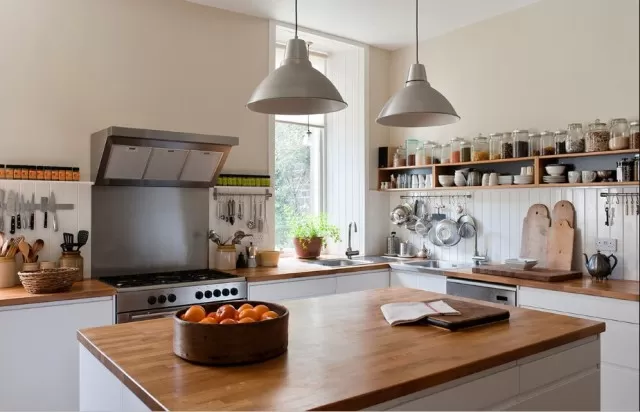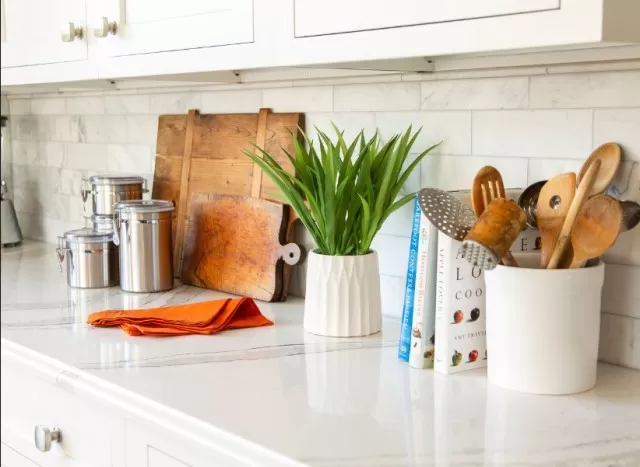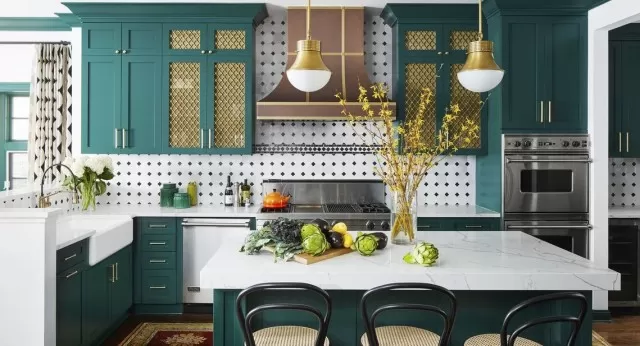Maintaining various types of kitchen countertops necessitates employing specific care methods.
Discover effective techniques for cleaning and caring for countertops crafted from granite, marble, tile, wood, and other materials.
By utilizing these straightforward Cleaning Tips, you can effortlessly keep your kitchen countertops pristine and free from stains.
Best Tips to clean kitchen Countertops

A detailed guide on cleaning and caring for different types of kitchen countertops:
Marble Countertops:
To clean marble countertops, use a damp soft cloth, preferably microfiber, to prevent streaks.
Avoid air-drying as marble is susceptible to water spots. For a deeper clean, mix a pH-neutral dishwashing liquid with warm water.
Rinse thoroughly and dry completely.
In case of stains on marble countertops, blot acidic liquids such as wine or citrus juice immediately.
Apply a poultice, a thick paste that absorbs stains, to remove most stains. For stubborn stains, professional assistance may be required.
Seal marble countertops using a product specifically designed for their porous surface.
Cultured-Stone Countertops, Including Quartz:
Clean cultured-stone countertops, like quartz, by wiping the surface with warm, Soapy Water or a mild bleach solution.
Avoid using abrasive cleaners or scrub pads to prevent scratches.
To remove stains from cultured-stone countertops, create a paste of baking soda and water.
Gently scrub the affected area with the paste and a soft brush. Rinse thoroughly and repeat if necessary.
Seal cultured-stone countertops with an appropriate sealer to prevent stains and ease cleaning.

Glass Countertops:
Clean glass countertops using standard soap or multi-purpose cleaners suitable for hard surfaces.
Use a soft cloth or sponge to avoid scratching the surface. Avoid abrasive cleaners and harsh Cleaning Tools.
Glass countertops are naturally stain-resistant and do not require sealing.
Solid-Surfacing Countertops:
Clean solid-surfacing countertops with water, soapy water, or cleaners specifically made for this material.
Dry the surface after cleaning to prevent film buildup. Occasional disinfection can be done with diluted bleach, followed by thorough rinsing.
Most stains on solid-surfacing countertops can be removed with soap and water.
For scorch marks, scratches, or persistent stains, consult with a countertop fabricator for appropriate solutions.
Solid-surfacing countertops do not need to be sealed.
Stainless-Steel Countertops:
For dry cleaning, use a microfiber cloth on stainless-steel countertops.
For wet cleaning, use a soft cloth with warm water and mild dishwashing liquid. Rinse with Clean Water and dry with a soft towel.
Stainless steel cleaners can be used for removing fingerprints and smudges.
Stainless steel countertops are stain-resistant and do not require sealing.

Wood Countertops:
Clean wood countertops with a mixture of mild dishwashing soap and water.
Rinse thoroughly and dry with a soft cloth.
To remove stains, blot as much as possible and try salt with lemon for light stains.
For deeper stains, let the salt and lemon sit overnight before rinsing. For darker stains, use a cotton swab dipped in a 3 percent hydrogen peroxide solution.
Sanding and refinishing may be necessary for stubborn stains.
Seal wood countertops by applying a light coat of mineral oil.
Wipe away excess oil and avoid using linseed or vegetable oil.
Cultured-Marble Countertops:
Clean cultured-marble countertops with warm, soapy water or a mild bleach solution.
Avoid abrasive cleaners and scrub pads to prevent scratching.
To remove stains, make a paste of baking soda and water.
Gently scrub the spot with the paste and a soft brush. Rinse thoroughly and repeat if needed.
Seal cultured-marble countertops with an appropriate sealer formulated for this material.
By following these cleaning and maintenance instructions tailored to specific countertop materials, you can keep your kitchen countertops clean and in excellent condition for years to come.
*The information is for reference only.